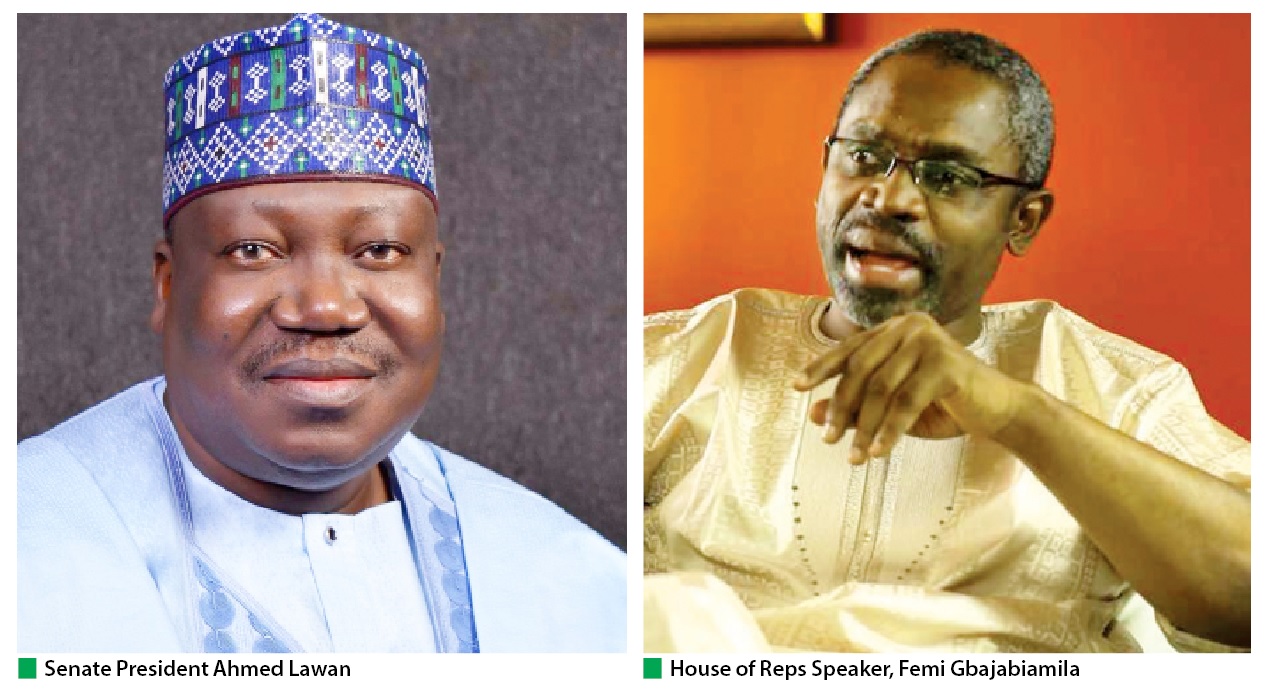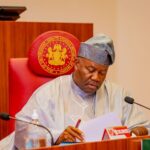Incessant requests for favours in terms of contracts, employment slots, among others are making heads of Ministries, Departments and Agencies (MDAs) to shun invitations of the National Assembly, Daily Trust reports.
A cross section of civil servants and National Assembly staff said that the request for favours in different forms is a key factor exposing the parliamentarians to ridicule.
- OBITUARY: Mahmud Tukur, Mamman Daura’s Ally who ‘Linked Buhari With Aisha’
- After recovery of 11 soldiers’ bodies: Army denies killing 70, locals want probe
Chief executives of government agencies and other public officials, on several occasions, shun the invitations extended to them by the National Assembly to respond to allegations levelled against them or their agencies, especially regarding their financial records.
Federal lawmakers described the disregard to their invitations by some public officials as an affront on the legislature, alleging that some heads of agencies were not ready to be accountable for their spending of public funds.
In most cases, the federal lawmakers invoke the necessary provisions of the law, including arrest warrant, to compel heads of agencies to appear before them.
Sections 88 of the 1999 Constitution as amended empowers the National Assembly to invite any person holding a public office to give account of any expenditure, or where it suspects that there is any infraction or corruption.
Apart from Public Accounts Committees of both chambers, which have the highest invitations to heads of MDAs mostly based on queries from the office of Auditor-General for the Federation, other committees also issue hundreds of invitations.
In some cases, the chief executives send representatives, who were mostly turned back by the lawmakers.
An official attached to the House of Representatives’ Public Accounts Committee, who does not want his name in print, said invitations extended to chief executives of MDAs are usually not a one-off matter.
According to him, an agency may be invited severally on different issues or tied to another involving a different agency.
He added that sometimes, the absence of heads of MDAs are justified, but multiple absence or flimsy excuses are not condoned and seen as disregard to the power of the parliament and breach of constitutional provisions.
Why N/Assembly summons are shunned
A retired director said the trend started since the country returned to democracy during the era of President Olusegun Obasanjo.
“It is a two-way thing. The lawmakers should be blamed on one hand, for over-romancing the heads of MDAs; on the other hand, the executive contributed to this by shielding the chief executives who shun the National Assembly invitations.
“You know it is a constitutional thing. But it is only when you abuse your office that the persons you are mandated to oversight will disrespect you.
“If you request for a contract for yourself or organisation that you have interest in and at the end of the day you are awarded but the project is not properly done, and after some time, you invite the agency over an infraction, they won’t honour you,” he said.
Another reason, according to him, is the attitudes of the presidency towards the parliament.
“Because of their closeness to the presidency, some heads of the MDAs including ministers see themselves as above the law. They capitalise on their closeness to the presidency and the attitudes of the president to misbehave
“If you recall when Jackson Gaius-Obaseki was summoned when he was group managing director of the Nigeria National Petroleum Corporation (NNPC) under Obasanjo, he refused to honour it because he was close to the president. And similar things are happening now,” he said.
Asked what the way out is, he said: “The only way is for the lawmakers to stick to their constitutional mandate and the president should read riot act to the heads of MDAs to honour invitations. You know the National Assembly exists to check the excesses of the executive.”
A retired committee clerk said the parliament should be properly funded to discharge its duties without relying on the executive.
“Look, how would they respect the lawmakers? The MDAs will sponsor your trip for oversight and you will see infractions whether in terms of contract execution or appointment, then you summon them to the parliament, will they take you seriously?” he said.
An aide of a lawmaker corroborated this when he narrated how two agencies under the supervision of her boss sponsored their oversight to the South West.
“The agencies shared the responsibilities. Our flight tickets were bought by one agency while another gave us accommodation and honorarium. Ours was an official engagement but we have some lawmakers who seek the sponsorship of social or their personal event from heads of MDAs,” he said.
Meanwhile, there are reactions from some of the MDAs and the private firms that have been summoned in recent time on why they do not honour invitations.
While they denied that they do not honour invitations, some officials who spoke in confidence gave reasons why they prefer sending representatives to such legislative proceedings.
AIICO Pension in a statement referred to the recent invitation of its MD, Mr Eguarekhide Longe, who it said enjoys cordial relationship with the lawmakers and could not have shunned their invitation as he sent a representative.
“In the past when we had cause to be invited to interactive sessions such as the one cited in the media reports, we always honoured the invitations.”
AIICO further disclosed that all documents requested by the committee were submitted.
An official of Shell explained why heads of IOCs mostly send representatives to summons and public hearings.
“Most of the reasons we have been invited for are around finance and audit. Our office is in the Niger Delta and we can’t be coming to Abuja always because at times these invitations come from different committees of both houses.
“The best thing most of the time is to send the expert in the field the summons will focus on. It is not that we disrespect the lawmakers; we hold them in esteem,” the top official noted.
Also in another comment, an official of the Ministry of Power said the Minister of Power and heads of agencies were summoned last year for various clarifications on power projects.
“Of course they attended some, but you don’t expect them to attend all when they were needed at the presidency. So what happens in such instances is to send the Permanent Secretary and the appropriate management officials to these invitations.”
A public affairs official of the Ministry of Petroleum Resources also noted that there was no plan to dishonour invitations.
“We have always obeyed summons and ensured the agencies under us provide adequate records. However, there are times that a minister could be represented by a permanent secretary, who is actually in charge of the technical explanations. Even if the minister appears before the lawmakers, he will always go with the permanent secretary; that is how we do it.”
Prominent summonses
Some of the prominent cases of summons in recent time include one by the Senate Committee on Public Accounts involving the Petroleum Products Pricing Regulators (PPPRA) early in March over a 2016 report by the Auditor-General for the Federation, which said the subsidy amount reflected in the Federation Account Allocation Committee (FAAC) record was N443 billion, while the record presented by the PPPRA showed N563bn.
The same committee also summoned officials of the Federal Ministry of Mines and Steel to explain why the ministry reported the same total revenue figure for years 2014, 2015 and 2016, and also did not remit N2.838bn solid mineral revenue to the federal account in 2016.
The House Committee on Pensions in February 2021 summoned Pension Funds Administrators (PFAs) over pension fund management.
A fracas ensued between the committee and the PFAs as the CEOs of AIICO Pension Managers and Fidelity Pension did not appear in person.
But in defending this position, AIICO Pension Regional Manager, Temitope Ajegboje, said his MD wanted to appear but had a medical emergency.
A branch head of Fidelity Pension, Oluchi Aneke-Ogala, was also sent as the representative of the MD but the committee rejected that and insisted on the appearance of the MD in person.
In December 2020, the Senate threatened to sanction International Oil Companies (IOCs) for not honouring summonses.
According to the Chairman, Senate Committee on Local Content, Senator Teslim Folarin (APC, Oyo), summonses conform to statutory regulations and provisions in Nigeria as he fumed that not even the Ministers of Labour and the MDs of IOCs appeared for the hearing but they sent representatives.
Similarly, the Interim Administrator, Niger Delta Development Commission (NDDC), Effiong Akwa, repeatedly shunned the summons of the Senate Committee on Ethics, Privileges and Public Petitions, asking him to respond to an allegation that the commission diverted N6.28bn meant to procure COVID-19 palliatives approved by President Muhammadu Buhari for the Niger Delta region.
An ex-agitator and convener, Network for Defence of Democracy and Good Governance (NDDGG), Sobomabo Jackrich, had in a petition he sent to the Senate last year against the sacked Interim Management Committee (IMC) of NDDC chaired by Keme Pondei accused the management of diverting the money.
The Senate Committee had tried on three occasions to conduct a public hearing on the petition but failed because the NDDC’s management failed to honour its invitations.
After the fourth invitation dated February 5, 2021, the committee issued an arrest warrant for NDDC boss, who later sent a representative to the committee chairman to explain how the money was spent.
The Senate committee on Public Accounts, which is probing the spending on June 11, 2020, threatened to issue a warrant of arrest for some heads of MDAs after their absence at an investigative hearing on the audit queries issued by the office of the auditor-general against their agencies.
The committee chairman, Senator Matthew Urhoghide, lamented that heads of agencies have cultivated the habit of failing to honour Senate invitations.
In March 2021, the Permanent Secretary of the Ministry of Foreign Affairs, Gabriel Aduda, also refused to appear before the Senate Public Accounts Committee, which summoned him to explain an audit query regarding alleged N4.3 billion hidden vouchers.
The management of the Nigerian Petroleum Development Company Limited, Benin City, and the National Petroleum Investment Management Services in Lagos, on March 11, 2021, shunned the invitation of the Senate Committee on Ethics, Privileges and Public Petitions to defend allegations of funds misappropriation and impunity levelled against them.
Messrs Ismail Mohammed and Haruna Danladi had written separate petitions against the SPDC and the NAPIMS management to the panel, alleging that the two agencies misappropriated the revenue due to the federal government running into billions of naira between 2016 and 2018.
In December 2019, the Senate joint committee on Navy, Maritime and Finance threatened warrant to arrest former NIMASA DG, Dakuku Peterside, after his failure to appear before the panel, investigating the activities of a private security firm, Ocean Marine Services Limited (OMSL), and some security agencies over the alleged collection of illegal fees for securing vessels at the Safe Anchorage Area in Lagos Ports.
In March 2020, the Governor of the Central Bank of Nigeria, Godwin Emefiele, refused to honour invitations extended to him by the Senate Public Accounts Committee, which asked him to address it on the release of $289 million cash to a former Director-General of the National Intelligence Agency, Ayo Oke, in 2015.
The panel, in February, also sought an explanation from CBN and the Accountant General of the Federation on how N596 billion ecological funds were spent from 1999 to 2015.
The chairman, Senator Matthew Urhoghide, said the CBN boss snubbed the panel’s invitation several times.
Customs boss, Hameed Ali, also shunned the Senate when he was summoned in March 2017 to brief senators on some Customs policies, notably the introduction of import duties on old vehicles.
Ali cited bereavement for his failure to honour the invitation.
Last week, members of the Senate Committee on Health knocked the Minister of Trade and Investment, Niyi Adebayo, and the Director-General of National Agency for Food and Drug Administration, NAFDAC, Professor Mojisola Adeyeye, when the duo failed to appear at a public hearing on the need to regulate the manufacturing, importation and use of syringes and needles in Nigeria.
Their representatives could not satisfactorily respond to the issues raised by the lawmakers, compelling them to issue a fresh summons on the two.
Last Tuesday, Senate President Ahmad Lawan slammed the two Ministers of Health and officials of the Ministry of Health over failure to attend a public hearing on three health-related bills in the Senate.
Lawan had, before declaring the session open, sought to know if the Minister of Health, Dr. Osagie Ehanire, and the Minister of State for Health, Dr. Olorunmibe Mamora, or their representatives were present at the hearing.
Having observed the absence of the two Ministers of Health and no official standing in for the ministry, Lawan said that the development was responsible for bills passed by the National Assembly which are sometimes denied assent by President Muhammadu Buhari due to wrong advice from ministry officials.
Recently, the House of Representatives’ Committee on Public Accounts vowed to invoke relevant sections of the constitution to compel the Group Managing Director of Nigerian National Petroleum Corporation (NNPC), Mele Kyari, and heads of 17 subsidiaries and agencies to appear before it after they shunned invitations to render accounts from 2014 to 2018.
However, in its response to the committee’s request, the NNPC said its GMD and other key executives could not appear because they have undertaken a compelling official trip out of the country geared towards the strategic interest of the economy of the nation.
In July 2020, the Speaker of the House of Representatives, Femi Gbajabiamila, frowned at the refusal of some banks to honour the invitation of the Joint Committee on Finance, Banking and Currency.
The committee investigated alleged over $30billion annual revenue leakage in the country arising from tax evasion, misuse and diversion of foreign exchange allocations by some firms. The chief executives of the banks invited were absent at the investigative hearing.
Ismail Mudashir, Abdullateef Salau, Balarabe Alkassim, Simon Echewofun Sunday, Zakariyya Adaramola (Abuja) & Sunday Michael Ogwu (Lagos)

 Join Daily Trust WhatsApp Community For Quick Access To News and Happenings Around You.
Join Daily Trust WhatsApp Community For Quick Access To News and Happenings Around You.


